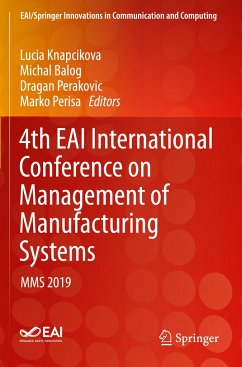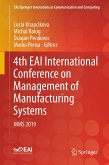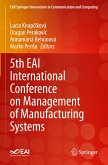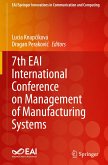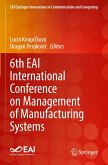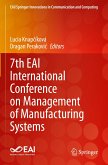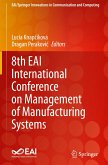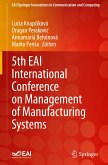4th EAI International Conference on Management of Manufacturing Systems
MMS 2019
Herausgegeben:Knapcikova, Lucia; Balog, Michal; Perakovic, Dragan; Perisa, Marko
4th EAI International Conference on Management of Manufacturing Systems
MMS 2019
Herausgegeben:Knapcikova, Lucia; Balog, Michal; Perakovic, Dragan; Perisa, Marko
- Broschiertes Buch
- Merkliste
- Auf die Merkliste
- Bewerten Bewerten
- Teilen
- Produkt teilen
- Produkterinnerung
- Produkterinnerung
The book presents the proceedings of the 4th EAI International Conference on Management of Manufacturing Systems (MMS 2019), which took place in Krynica Zdroj, Poland, on October 8-10, 2019. The conference covered Management of Manufacturing Systems with support for Industry 4.0, Logistics and Intelligent Manufacturing Systems and Applications, Cooperation management and its effective applications. Topics include RFID Applications, Economic Impacts in Logistics, ICT Support for Industry 4.0, Industrial and Smart Logistics, Intelligent Manufacturing Systems and Applications, and much more.
Andere Kunden interessierten sich auch für
![4th EAI International Conference on Management of Manufacturing Systems 4th EAI International Conference on Management of Manufacturing Systems]() 4th EAI International Conference on Management of Manufacturing Systems121,99 €
4th EAI International Conference on Management of Manufacturing Systems121,99 €![5th EAI International Conference on Management of Manufacturing Systems 5th EAI International Conference on Management of Manufacturing Systems]() 5th EAI International Conference on Management of Manufacturing Systems241,99 €
5th EAI International Conference on Management of Manufacturing Systems241,99 €![7th EAI International Conference on Management of Manufacturing Systems 7th EAI International Conference on Management of Manufacturing Systems]() 7th EAI International Conference on Management of Manufacturing Systems201,99 €
7th EAI International Conference on Management of Manufacturing Systems201,99 €![6th EAI International Conference on Management of Manufacturing Systems 6th EAI International Conference on Management of Manufacturing Systems]() 6th EAI International Conference on Management of Manufacturing Systems129,99 €
6th EAI International Conference on Management of Manufacturing Systems129,99 €![7th EAI International Conference on Management of Manufacturing Systems 7th EAI International Conference on Management of Manufacturing Systems]() 7th EAI International Conference on Management of Manufacturing Systems201,99 €
7th EAI International Conference on Management of Manufacturing Systems201,99 €![8th EAI International Conference on Management of Manufacturing Systems 8th EAI International Conference on Management of Manufacturing Systems]() 8th EAI International Conference on Management of Manufacturing Systems166,99 €
8th EAI International Conference on Management of Manufacturing Systems166,99 €![5th EAI International Conference on Management of Manufacturing Systems 5th EAI International Conference on Management of Manufacturing Systems]() 5th EAI International Conference on Management of Manufacturing Systems241,99 €
5th EAI International Conference on Management of Manufacturing Systems241,99 €-
-
-
The book presents the proceedings of the 4th EAI International Conference on Management of Manufacturing Systems (MMS 2019), which took place in Krynica Zdroj, Poland, on October 8-10, 2019. The conference covered Management of Manufacturing Systems with support for Industry 4.0, Logistics and Intelligent Manufacturing Systems and Applications, Cooperation management and its effective applications. Topics include RFID Applications, Economic Impacts in Logistics, ICT Support for Industry 4.0, Industrial and Smart Logistics, Intelligent Manufacturing Systems and Applications, and much more.
Produktdetails
- Produktdetails
- EAI/Springer Innovations in Communication and Computing
- Verlag: Springer / Springer International Publishing / Springer, Berlin
- Artikelnr. des Verlages: 978-3-030-34274-6
- 1st edition 2020
- Seitenzahl: 328
- Erscheinungstermin: 4. März 2021
- Englisch
- Abmessung: 235mm x 155mm x 18mm
- Gewicht: 499g
- ISBN-13: 9783030342746
- ISBN-10: 3030342743
- Artikelnr.: 61129666
- Herstellerkennzeichnung Die Herstellerinformationen sind derzeit nicht verfügbar.
- EAI/Springer Innovations in Communication and Computing
- Verlag: Springer / Springer International Publishing / Springer, Berlin
- Artikelnr. des Verlages: 978-3-030-34274-6
- 1st edition 2020
- Seitenzahl: 328
- Erscheinungstermin: 4. März 2021
- Englisch
- Abmessung: 235mm x 155mm x 18mm
- Gewicht: 499g
- ISBN-13: 9783030342746
- ISBN-10: 3030342743
- Artikelnr.: 61129666
- Herstellerkennzeichnung Die Herstellerinformationen sind derzeit nicht verfügbar.
Lucia Knap¿íková is Associate Professor at the Department of Industrial Engineering and Informatics at the Faculty of Manufacturing Technologies, TU Koice. In 2017 she completed her habilitation at the Faculty in the field "Manufacturing Technologies". Assoc.Prof. Dr. Knap¿íková is author more than 130 scientific papers in Slovakia and abroad and 6 utility models. She participated in several international research projects, mainly in Germany. Most important project is H2020 "Less Than Wagon Load" in collaboration with Belgium, Germany, Netherland, Italy and Slovakia, where her position in the project is Faculty project manager. She lectured at the universities in Germany, Czech Republic and Croatia. Her area of interest includes utilization of secondary raw materials, technologies of their processing and materials testing. Michal Balog is head of Department of Industrial Engineering and Informatics at Faculty of Manufacturing Technologies witha seat in Preov, TU Koice. His scientific and educational field is oriented on the green logistics, management, quality control and methods of production systems. He is the organizer of many domestic and international conferences, acts as tutor on PhD study programs and has participated in numerous slovak and international projects as team member and as the project head. Most important project is H2020 "Less Than Wagon Load", where he participated as a team member and in the year 2015 he finished project entitled "Promotion & Enhancement of Centre for Research on Transportation" with EU Structural Funds. He is author more than 100 publications in Slovakia and abroad. Dragan Perakovi¿ graduated with a Master's from Faculty of Postal and Telecommunication Traffic, where he thesis was entitled "Possibilities of implementing mobile internet in intelligent transport systems". In 2005, he achieved a Ph. D. in a field of technical sciences, field ofTechnological Systems in Traffic and Transport by defending the doctoral dissertation entitled "Information distribution model for users of traffic system" at the Faculty of Transport and Traffic Sciences, University of Zagreb. Marke Perisa has been employed as an assistant at the Faculty of Transport and Traffic Sciences since 2005. He participates in undergraduate, graduate and undergraduate teaching in the field of information and communication traffic in the Department of Information and Communication Traffic. In 2013 defended Ph.D. dissertation named "Dynamic guiding and routing of disabled and visually impaired persons in traffic" at the University of Zagreb.
Chapter 1. Definition of the IoT device classes based on network traffic flow features.- Chapter 2. RFID Monitoring and Accounting System in Health-care Facilities.- Chapter 3. Smart, Smarter and Smartest City - the Method to Comparison of Cities.- Chapter 4. Aerial Photogrammetry and Unmanned Aerial Vehicles (UAVs) like a smart technology for digital as-built mapping of existing buildings.- Chapter 5. Lifts as Part of Smart Buildings.- Chapter 6. The Concept of Implementing NFC Identification Technology for Transporting and Monitoring of Biological Samples.- Chapter 7. Possibility of identification transport units through RFID technology at own level of the company.- Chapter 8. Automatic Identification Applications for Smart Railway Concept.- Chapter 9. Simulation and Modelling of Transport Processes for the Needs of Mineral Resources Delivery Support.- Chapter 10. Testing the replenishment model strategy using software Tecnomatix Plant Simulation.- Chapter 11. Identification of the relevant parameters for modeling the ecosystem elements in Industry 4.0.- Chapter 12. Evaluation Of the Workplace In Order To Reduce Waste In Material Flow.- Chapter 13. Digital twin of experimental workplace for quality control with Cloud Platform support.- Chapter 14. Hazardous work and destructive elements in the working environment and risk categories in a mining company.- Chapter 15. Chemical Management in Automotive and Mass Industry.- Chapter 16. Impact of BIM technology on development of digital and managerial competencies of project managers in construction industry.- Chapter 17. Impact of BIM technology on time-reducing in conditions of Slovak construction industry.- Chapter 18. Management of time structure with respect of a production process efficiency.- Chapter 19. On statistical methods based information system for decision support of municipalities.- Chapter 20. Possibilities of data analysis using data model.- Chapter 21. Regression Model by the Management for Preparation of the Permalloy Sample.- Chapter 22. Statistical evaluation of market potential location of a new product that uses renewable energy sources.- Chapter 23. Adaptive Assembly Approach for E-Axles.- Chapter 24. Parameter Identification of Technological Equipment for Ensuring the Reliability of the Vibration Separation Process.- Chapter 25. Optimizing component production with multi-axis turning technology.- Chapter 26. Development of chosen social and economic indicators of raw materials using in context of sustainability in Slovakia.
Chapter 1. Definition of the IoT device classes based on network traffic flow features.- Chapter 2. RFID Monitoring and Accounting System in Health-care Facilities.- Chapter 3. Smart, Smarter and Smartest City - the Method to Comparison of Cities.- Chapter 4. Aerial Photogrammetry and Unmanned Aerial Vehicles (UAVs) like a smart technology for digital as-built mapping of existing buildings.- Chapter 5. Lifts as Part of Smart Buildings.- Chapter 6. The Concept of Implementing NFC Identification Technology for Transporting and Monitoring of Biological Samples.- Chapter 7. Possibility of identification transport units through RFID technology at own level of the company.- Chapter 8. Automatic Identification Applications for Smart Railway Concept.- Chapter 9. Simulation and Modelling of Transport Processes for the Needs of Mineral Resources Delivery Support.- Chapter 10. Testing the replenishment model strategy using software Tecnomatix Plant Simulation.- Chapter 11. Identification of the relevant parameters for modeling the ecosystem elements in Industry 4.0.- Chapter 12. Evaluation Of the Workplace In Order To Reduce Waste In Material Flow.- Chapter 13. Digital twin of experimental workplace for quality control with Cloud Platform support.- Chapter 14. Hazardous work and destructive elements in the working environment and risk categories in a mining company.- Chapter 15. Chemical Management in Automotive and Mass Industry.- Chapter 16. Impact of BIM technology on development of digital and managerial competencies of project managers in construction industry.- Chapter 17. Impact of BIM technology on time-reducing in conditions of Slovak construction industry.- Chapter 18. Management of time structure with respect of a production process efficiency.- Chapter 19. On statistical methods based information system for decision support of municipalities.- Chapter 20. Possibilities of data analysis using data model.- Chapter 21. Regression Model by the Management for Preparation of the Permalloy Sample.- Chapter 22. Statistical evaluation of market potential location of a new product that uses renewable energy sources.- Chapter 23. Adaptive Assembly Approach for E-Axles.- Chapter 24. Parameter Identification of Technological Equipment for Ensuring the Reliability of the Vibration Separation Process.- Chapter 25. Optimizing component production with multi-axis turning technology.- Chapter 26. Development of chosen social and economic indicators of raw materials using in context of sustainability in Slovakia.

